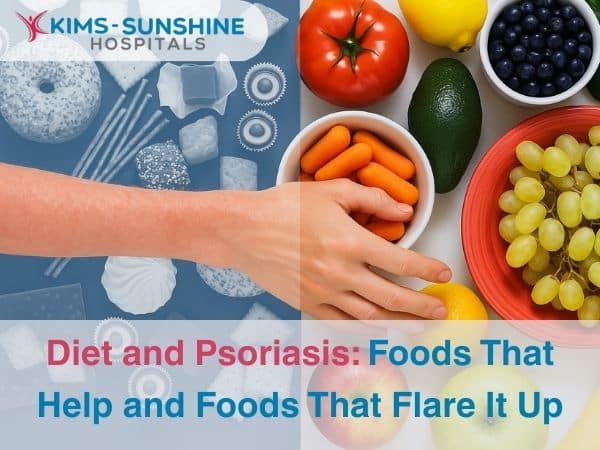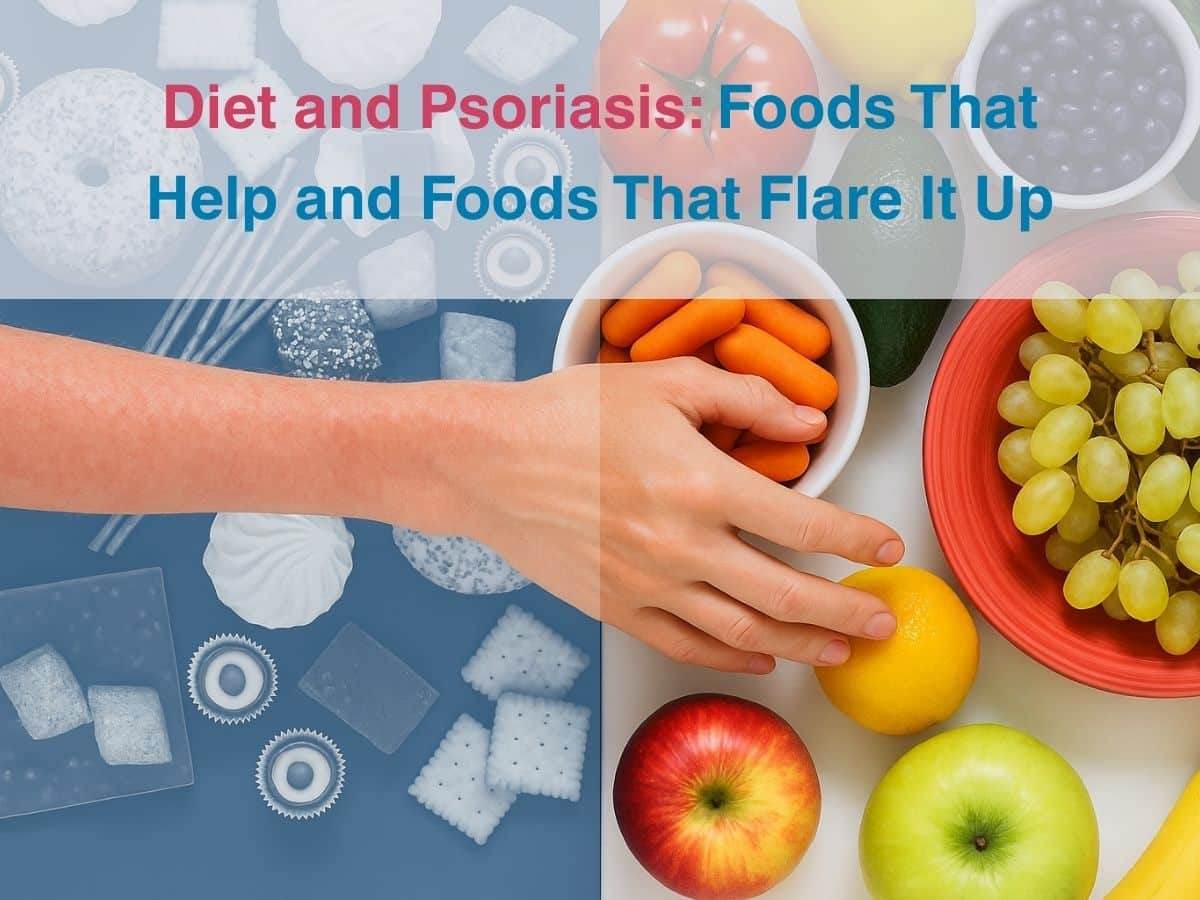
Diet and Psoriasis: Foods That Help and Foods That Can Cause It to Flare Up
 Psoriasis is a chronic, autoimmune disease affecting skin cells. It causes them to divide uncontrollably and build up, causing red scaly patches all over the skin. This is a non-contagious skin disease and can vary in severity. Psoriasis can be mediated by immune responses, genetic influences and environmental factors. Food not only provides energy, but also helps in maintaining health and wellness by providing necessary nutrients to the cells for functioning. Certain studies have revealed that pro-inflammatory foods like dairy products, alcohol, high sugar diets and gluten exaggerate psoriatic conditions.
Psoriasis is a chronic, autoimmune disease affecting skin cells. It causes them to divide uncontrollably and build up, causing red scaly patches all over the skin. This is a non-contagious skin disease and can vary in severity. Psoriasis can be mediated by immune responses, genetic influences and environmental factors. Food not only provides energy, but also helps in maintaining health and wellness by providing necessary nutrients to the cells for functioning. Certain studies have revealed that pro-inflammatory foods like dairy products, alcohol, high sugar diets and gluten exaggerate psoriatic conditions.
Major psoriasis can trigger or appear in a person under extreme stress conditions and in India, prevalence is estimated to be around 0.44 to 2.8%. More males are affected between 20-30 years of age, compared to women.
Foods That Trigger Psoriasis Flare-Ups
Since psoriasis is an autoimmune condition where the immune system works overtime, it can cause simple foods to also act as possible triggers- which can cause your condition to flare up or get worse. Some well known triggers include-
- Red meat and dairy: The presence of arachidonic acid in these foods causes flaring up of psoriatic lesions and inflammation.
- Processed foods: high content of salt and sugars with unhealthy fats can increase inflammation and obesity that flares up psoriasis.
- Increased sugar content found in refined products like pasta, white bread, polished rice and pastries can spike blood sugars, leading to a flare up.
- Some individuals are sensitive and allergic to gluten protein and this allergy can worsen symptoms of psoriasis.
- Vegetables belonging to the solanaceae or nightshade groups like tomato, potatoes, brinjals and peppers may be problematic, as they contain solanine – a substance which is pro-inflammatory in nature. psoriasis.
- Alcohol can also make flare ups worse and harder to deal with.
- Caffeine effects may vary with the amount of consumption as some individuals have noted worsening symptoms with consumption.
- Some citrus fruits like oranges or lemons can irritate skin in sensitive individuals suffering from psoriasis.
- Processed snacks that increase bad cholesterol can aid in increasing psoriatic inflammation.
Anti-Inflammatory Diet For Psoriasis
These are the foods you SHOULD be eating-
- An anti-inflammatory diet for psoriatic conditions accentuates whole foods such as fruits, vegetables, lean proteins and healthy fats.
- Fruits and vegetables which are rich in antioxidants like berries, green leafy vegetables like spinach, fenugreek, carrots etc are advised.
- Omega-3 fatty acids found in fishes like salmon, sardines and in nuts like chia seeds are very helpful in reducing inflammation.
- Intake of healthy fats like olive oil, cold pressed oils like groundnut, mustard and sesame oil, avocado, nuts and seeds help in tackling inflammation.
- Your diet must also have lean protein derived from fish, tofu, beans and lentils.
- Include antioxidant rich spices like garlic, ginger, turmeric and other herbs as they are anti-inflammatory in nature.
- Whole grains like brown rice, whole wheat flour, millets help in maintaining blood sugar levels as their glycaemic index is low. This can help in soothing the symptoms of psoriasis.
Weight, Supplements And Psoriasis
Obesity is a cause for many chronic conditions and increased weight and fat in the body can cause systemic inflammation, which causes psoriasis to flare up uncontrollably.
Managing psoriasis with various supplements has helped individuals in managing their symptoms but their effectiveness is still being studied. Some beneficial supplements like fish oil which is rich in omega 3 fatty acids decreases inflammation. Vitamin D can be used as a topical and oral agent which can influence skin cell growth for psoriatic individuals. Turmeric has curcumin -an active compound known for its anti-inflammatory properties. Selenium deficiency is also common in individuals with psoriasis and supplementation may help.
Conclusion
Auto immune diseases like psoriasis are treated with long term medications and managed with other measures like diet and lifestyle. The definitive explanatory cause for psoriasis is unknown while it is mostly thought to be due to genetics and increased stress. Many studies are being conducted to understand the disease and its management with diet. Many have shown that foods which are rich in omega 3 fatty acids, gluten free or sugar free can clinically help, as flare ups reduce. So, yes you are what you eat – and your skin is, even more so!






